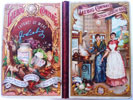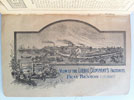Practical Cookery Book.
A collection of new and useful recipes in every branch of cookery. Compiled by Mrs H.M. Young. LONDON Leibig's Extract of Meat Company, Limited. 9 FENCHURCH AVENUE, E.C. 1893 (All rights reserved). PRINTED IN GERMANY.
FIRST EDITION. 172 X 113MM. 2p Highly decorated inside front cover and Title page. Verso has an intriguing etching of the Liebig Factory, Frey Bentos, Uruguay. 1-111 Index. iv Advertisement page. v-vii Introduction. viii Preface. 1p Recipes. [1] 1-104. Highly decorated inside back cover. Beautifully decorated and colourful boards sometime expertly relaid. The guttering has a little rust form the staples not affecting the look or text. Overall a very nice complete copy of a very scarce company booklet that is not usually found in such good condition.
- The Liebig Extract of Meat Company (Lemco) was the originator of Liebig and Oxo meat extracts and later Oxo beef stock cubes. Baron Justin von Liebig invented a way to preserve the flavour of meat in the form of an extract. In the 1860's the Baron was known as a very active organic chemist and was invited to be a shareholder in a Uruguayan firm to produce a meat extract and transport the liquid in tons to Europe. (with no weight of skin, bones nor meat) The idea appealed to the Baron and promised to be very lucrative, so the company was established in December 4th 1865 in London. The factory was based at Fray Bentos at Villa Independencia, on the river Uruguay, (see image #2 below) where fresh air and an unlimited supply of water were an indispensable necessity for the slaughter of 1,500 four year old oxen daily during the seven months of the slaughter season. The company employed about 1000 hands, and with wives and children supported a community of 3000. The meat extract was a molasses-like black spread packaged in an opaque white glass bottle, and contained only reduced meat stock and salt (4%). It took 3 kg of meat to make 100 g of extract. By 1875, 500 tonnes of the extract were being produced at the Fray Bentos plant each year. The manufacture of the meat extract was done under the strict control of a company chemist. It was then shipped to Antwerp. On arrival in Europe it was again inspected and samples of each consignment were tested for composition and flavour. In the booklet the public are cautioned against various imitations. In 1873, Liebig's began producing tinned corned beef, sold under the label Fray Bentos. Later, freezer units were installed, enabling the company to also export frozen and chilled raw meat. A cheaper version of Liebig extract was introduced under the name Oxo in 1899. Later, the Oxo bouillon cube was introduced. In the 1920s, the company acquired the Oxo Tower Wharf on the south bank of the river Thames in London. There they erected a factory, demolishing most of the original building, preserving and building upon the riverside frontage. The Liebig Extract of Meat Company was acquired by the Vestey Group in 1924 and the factory was renamed El Anglo. Liebig merged with Brooke Bond in 1968, which was in turn acquired by Unilever in 1984. Liebig produced many illustrated advertising products: table cards, menu-cards, children games, free trade card sets, calendars, posters, poster-stamps, paper and other ephemera. These were often in the form of trading card sets with stories, historical tidbits, geographic tidbits, and so on. The sets usually consisted of six cards, one card included per product sale. Many famous artists were contracted to design those series of cards, which were first produced using true lithography, then litho chromo, chromolithography and finally offset printing. The cards remain popular with collectors and are often collected in albums. Copies of Liebig's recipe booklet are also much sought after. Due to the fact that they did not survive well in the oily and robust kitchen environment, lovely clean copies such as this one are quite rare.





click on image to enlarge

Antiquarian category
ref number:
11147